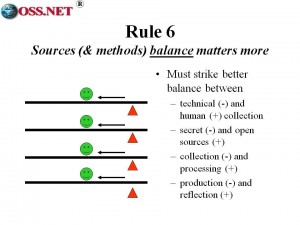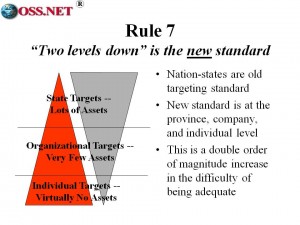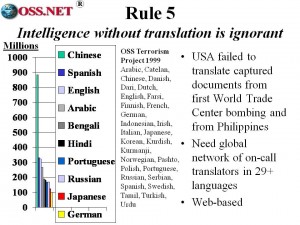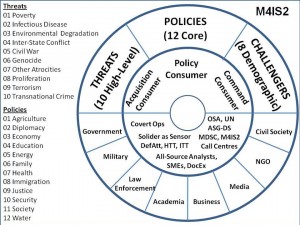
Journal: Secret World Still Short on All Languages
Collection, ICT-IT, Languages-Translation, Leadership-Integrity, Multinational Plus, Processing, Strategy-Holistic Coherence
IC's Language, Linguistic Shortfalls Under Scrutiny
by Anthony L. Kimery
Thursday, 21 January 2010
The IC still has important pockets of critical intelligence analysis that continue to suffer.
The rank and file analysts at the CIA, NSA and elsewhere throughout the Intelligence Community (IC) are patriotic, dedicated … hardworking. But they have long been hampered by a lack of both linguists and language proficient subject matter experts to help them make sense of the overwhelming storm of intelligence that is routinely siphoned from the air and gathered by human intelligence sources every day. This blizzard of information is blinding.
According to IC sources HSToday.us talked on background, the IC’s failure to detect the recent attempted terrorist attacks on the US homeland wasn’t just about the failure to connect the existing dots – of which there were many – but also was because of the inability to quickly and effectively interpret country-language specific intelligence, such as that which was collected in Yemen.
. . . . . . .
Last July, the Senate Select Committee on Intelligence reported that it “is concerned about the abysmal state of the Intelligence Community’s foreign language programs.”
The Committee’s report noted that “the collection of intelligence depends heavily on language, whether information is gathered in the field from a human source or from a technical collection system. Even traditionally nonlinguistic operations such as imagery rely on foreign language skills to focus and direct collection efforts.”
However, the Committee concluded, “almost eight years after the terrorist attacks of September 11th and the shift in focus to a part of the world with different languages than previous targets, the cadre of intelligence professionals capable of speaking, reading, or understanding critical regional languages such as Pashto, Dari, or Urdu remains essentially nonexistent.”
Continuing, the report stated that “the Intelligence Reform Act required the DNI [Office of the Director of National Intelligence] to identify the linguistic requirements of the Intelligence Community, and to develop a comprehensive plan to meet those requirements.”
But “five years later, the ODNI has still not completed an IC-wide comprehensive foreign language plan that designates specific linguist or language requirements, lays out goals or timelines, or designates specific actions required to meet them.”
Continue reading “Journal: Secret World Still Short on All Languages”
Graphic: Zero-Based “Clean Sheet” Needs Study
Advanced Cyber/IO, Analysis, Balance, Capabilities-Force Structure, Collection, Geospatial, History, ICT-IT, Innovation, Languages-Translation, Leadership-Integrity, Multinational Plus, Policies-Harmonization, Political, Processing, Reform, Strategy-Holistic Coherence, Threats, TribesGraphic: Balance Matters
Balance, Capabilities-Force Structure, Collection, Innovation, Multinational Plus, Processing, Reform, Strategy-Holistic Coherence, Threats, Tribes
Click on Graphic to reach the Briefing. Based on Chapter 15, “New Rules for the New Craft of Intelligence” as first published in THE NEW CRAFT OF INTELLIGENCE: Personal, Public, & Political (OSS, 2002).
Graphic: Two-Levels Down
Balance, Citizen-Centered, Collection, Innovation, Multinational Plus, Threats, Tribes
Click on Graphic to reach the Briefing. Based on Chapter 15, “New Rules for the New Craft of Intelligence” as first published in THE NEW CRAFT OF INTELLIGENCE: Personal, Public, & Political (OSS, 2002).
Graphic: Multi-Lingual Reality
Analysis, Balance, Capabilities-Force Structure, Collection, Languages-Translation, Multinational Plus
Click on Graphic to reach the Briefing. Based on Chapter 15, “New Rules for the New Craft of Intelligence” as first published in THE NEW CRAFT OF INTELLIGENCE: Personal, Public, & Political (OSS, 2002).
Graphic: Whole of Government Intelligence
Advanced Cyber/IO, Analysis, Balance, Capabilities-Force Structure, Earth Orientation, Innovation, Leadership-Integrity, Multinational Plus, Policies-Harmonization, Political, Processing, Reform, Strategy-Holistic Coherence, Threats, Tribes
Somebody somewhere has to do this, and do it with over 90 nations, all NGOs, and global reach into all academic and private sector organizations desiring to share information and do multilateral sense-making.
References:
2009 DoD OSINT Leadership and Staff Briefings
2009: Human Intelligence (HUMINT) Trilogy


